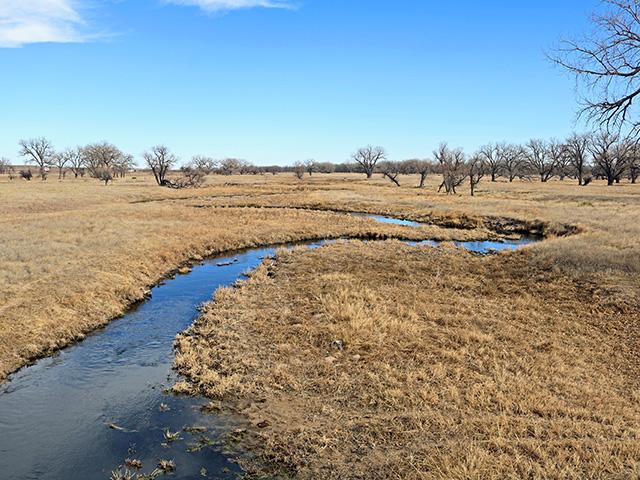Aggies Join 24-State Lawsuit vs. WOTUS
WOTUS Now Challenged by 24 States Plus Several Ag Groups in Two Different Federal Courts
LINCOLN, Neb. (DTN) -- Twenty-four states sued the Biden administration on the new waters of the U.S. rule last week, and now the American Farm Bureau Federation and other ag groups have joined in the fight.
In a joint lawsuit filed in the U.S. District Court for the District of North Dakota, the states argue the EPA and the U.S. Army Corps of Engineers have overstepped their legal authority by expanding control of waters already regulated by the states.
The states asked the court to vacate and set aside the final rule and to send it back to the agencies to "issue a rule that complies with the Constitution." The states argue the rule violates the Administrative Procedure Act.
"The final rule is riddled with problems," the states said in their lawsuit.
"It exceeds the agencies' statutory jurisdiction and authority under the CWA by encompassing waters with no reasonable connection to 'navigable waters.' It is arbitrary and capricious because -- among other things -- it embraces vague standards with little justification and minimal consideration of costs."
The lawsuit, which was filed by the states of Alabama, Alaska, Arkansas, Florida, Georgia, Indiana, Iowa, Kansas, Louisiana, Mississippi, Missouri, Montana, Nebraska, New Hampshire, North Dakota, Ohio, Oklahoma, South Carolina, South Dakota, Tennessee, Utah, Virginia, West Virginia and Wyoming, said the agencies have "toppled the cooperative federalism regime" by implementing a rule that is "overbroad and hopelessly vague."
This week, several business intervenors in the case filed a memorandum in support of intervening, including the American Farm Bureau Federation, National Cattlemen's Beef Association, National Corn Growers Association, National Pork Producers Council and others.
"The 2023 rule creates enormous uncertainty for the regulated community, using impermissibly vague standards that will require costly case-by-case determinations or else will require property owners and users to scale-back or forgo important projects altogether or risk criminal penalties and significant fines," the groups said in a court filing.
P[L1] D[0x0] M[300x250] OOP[F] ADUNIT[] T[]
The ag groups also contend the new rule "reads the word 'navigable' out of the statute and therefore is disconnected" from Congress's intent with the Clean Water Act.
The states' lawsuit is the third of its kind filed in federal court.
The state of Texas also filed a lawsuit challenging the WOTUS rule in the U.S. District Court for the Southern District of Texas. That was followed by a similar lawsuit filed by the AFBF in the same court. Those cases have been consolidated. The parties filing that lawsuit have until March 10 to file briefs.
The current legal landscape on the WOTUS front is playing out much like it did when the 2015 rule faced lawsuits.
The first time around, the federal court in North Dakota issued an injunction against the 2015 rule in August 2015, preventing its enforcement in 13 states while a legal challenge continued.
In a memo filed with the North Dakota court this week, AFBF and the other groups document the WOTUS cases they've been involved with in requesting to intervene.
"The prior cases in which proposed business intervenors were involved are closely interconnected with the current challenge to the 2023 rule," the groups said.
"Each addresses the lawful scope of the agencies' authority under the CWA to regulate land and waters, and affects the ability of industry and private parties, like proposed business intervenors' members and their members' clients, to use their land without obtaining a CWA permit."
The 24 states said in their lawsuits the agencies didn't take into account in the final rule the "unique ecological, geological and hydrological differences among the states" and have "ignored the scientific expertise of the state regulators" who are charged with protecting state waters.
"In the final rule the agencies repeatedly relied on scraps of legislative history to argue that they were justified in pursuing 'the broadest possible constitutional interpretation' of their own jurisdictional provision," the states said.
"Yet that same legislative history -- such as it is -- stresses that waters must comprise part of the 'continuing highway over which commerce is or may be carried on with other states' before they can constitute 'waters of the United States.'"
Read more on DTN:
"Texas, Ag Ask for WOTUS Injunction," https://www.dtnpf.com/…
"Rancher: Ag Overwhelmed by WOTUS," https://www.dtnpf.com/…
Todd Neeley can be reached at todd.neeley@dtn.com
Follow him on Twitter @DTNeeley
(c) Copyright 2023 DTN, LLC. All rights reserved.




